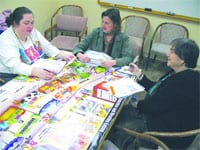BFMC Alters Format of Diabetes-education Class
GREENFIELD — Baystate Franklin Medical Center is now offering a highly interactive education program for people with diabetes. Taught by Judy Kuzdeba, diabetes educator at BFMC, the classes are based on the use of a new series, the Diabetes Conversation Maps program. Alyson Fisher, a dietitian at the hospital, will join Kuzdeba in teaching the food-and-nutrition segment of the program.
Developed by the American Diabetes Association and Healthy Interactions, Inc. (Healthyi), the maps are designed to help people learn about diabetes and lifestyle modifications through discussions moderated by a health care professional.
Each class consists of a series of four two-hour sessions, during which participants use ‘maps’ to explore healthy eating, blood-glucose monitoring, and the continuing diabetes journey. Kuzdeba and the participants focus on a large, colorful picture/map, around which discussions are centered.
“The metaphor of the map serves as a great starting point for each aspect of the diabetes experience,” she said. “First off, viewing the basics of diabetes management as the foundation for your personal journey toward health makes it much more interesting and compelling. Then, sitting around the conversation map with others who are facing similar journeys helps pull everyone together as fellow travelers. Participants can ask questions about what they are most interested in learning, and they are also learning from each other’s experiences and knowledge. They retain more important information through this kind of interaction, and as a result become better self-managers of their diabetes.”
The standard Conversation Map questions help assure that certain topics are discussed, yet they are flexible enough to allow each group to navigate its own process, depending on the specific needs and interests of the members.
Kuzdeba further engages participants by having everyone take turns reading the fact and question cards. “It has kind of a gamelike feel, and helps all the participants to be actively involved in the learning process,” she said. “This has proven to be a lot more fun than traditional classroom presentations, and a very valuable way for adults to learn, retain the information, and ultimately change their behaviors so they can manage their diabetes most effectively.”
Classes are held throughout the year, and are scheduled to accommodate the participants. For more information about joining an upcoming Diabetes Education ‘Conversation Map’ class, contact Kuzdeba at (413) 773-2097.


